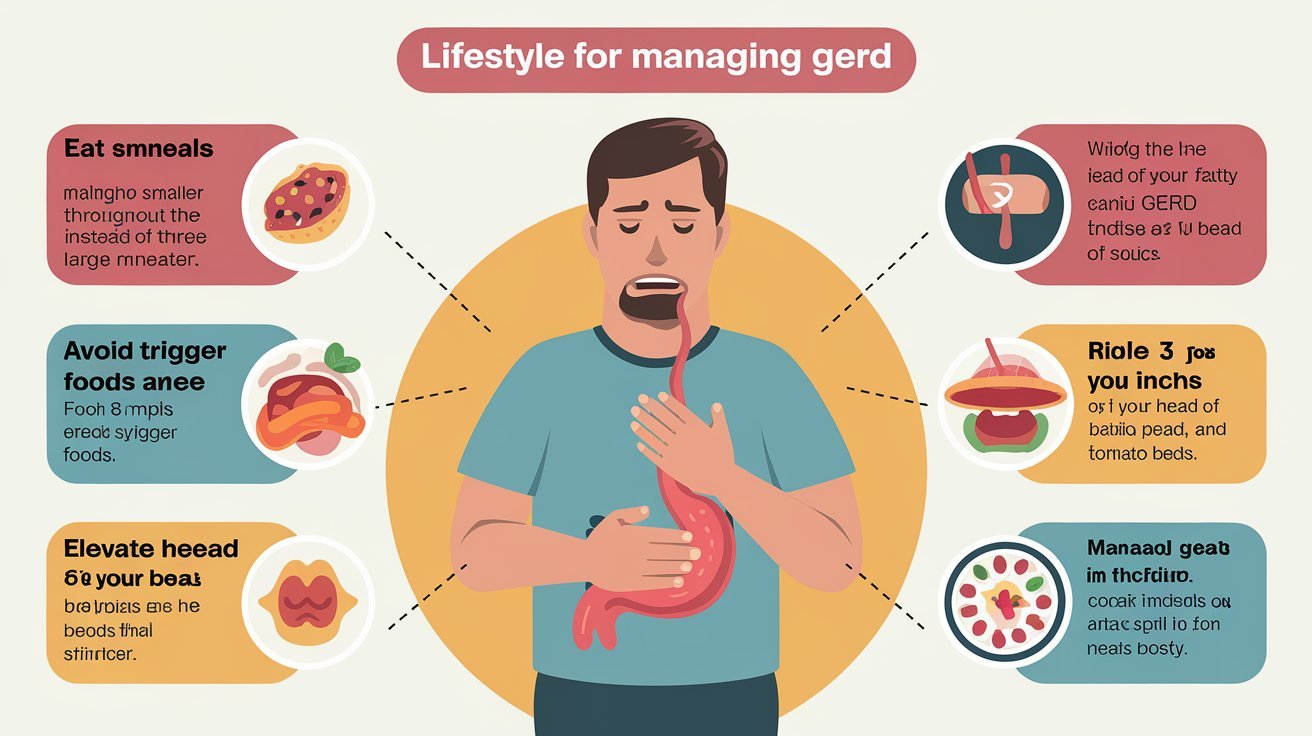Lifestyle Modifications for Managing GERD
Gastroesophageal Reflux Disease (GERD) is a chronic condition where stomach acid frequently flows back into the oesophagus, leading to symptoms such as heartburn, regurgitation, and discomfort. While medication can help manage GERD, lifestyle modifications play a crucial role in reducing symptoms and improving overall quality of life. Here’s a comprehensive guide to lifestyle changes that can help manage GERD effectively.
1. Adopt a GERD-Friendly Diet
Avoid Trigger Foods: Certain foods and beverages can trigger GERD symptoms. Common culprits include spicy foods, fatty foods, chocolate, caffeine, and carbonated drinks. Keeping a food diary can help identify personal triggers. Aim to limit or eliminate these items from your diet.
Eat Smaller, More Frequent Meals: Large meals can increase stomach pressure and exacerbate GERD symptoms. Opt for smaller, more frequent meals throughout the day. This helps reduce the amount of food in the stomach at one time, minimizing the risk of acid reflux.
Choose Alkaline and Low-Acidity Foods: Less acidic Foods can help counteract stomach acid. Incorporate alkaline foods such as bananas, melons, oatmeal, and green vegetables into your diet. These foods are less likely to trigger GERD symptoms and can provide relief.
Stay Hydrated: Drinking plenty of water throughout the day can help dilute stomach acid and promote digestion. However, avoid drinking large amounts of water during meals, as this can increase stomach pressure.
2. Maintain a Healthy Weight
Excess weight, particularly around the abdomen, can put pressure on the stomach and exacerbate GERD symptoms. Losing weight, if needed, can significantly reduce reflux episodes and improve overall health. Incorporate regular physical activity into your routine and focus on a balanced diet to achieve and maintain a healthy weight.
3. Adjust Your Eating Habits
Avoid Eating Before Bed: Eating large meals or snacks close to bedtime can increase the likelihood of nighttime acid reflux. Aim to finish eating at least 2-3 hours before going to bed. This allows your stomach to empty and reduces the risk of acid reflux while lying down.
Chew Your Food Thoroughly: Eating slowly and chewing your food thoroughly can aid digestion and reduce the likelihood of acid reflux. This practice helps your stomach process food more efficiently and reduces the chance of overeating.
4. Modify Your Sleeping Position
Elevate the Head of Your Bed: Raising the head of your bed by 6-8 inches can help prevent acid from flowing back into the oesophagus while you sleep. Use a wedge pillow or adjust the bed frame to achieve this elevation. Avoid using extra pillows, as this can lead to neck and back discomfort.
Sleep on Your Left Side: Studies suggest that sleeping on your left side may reduce GERD symptoms more effectively than sleeping on your right side or back. This position helps keep the lower oesophagal sphincter above stomach acid, reducing reflux.
5. Avoid Smoking and Limit Alcohol Intake
Quit Smoking: Smoking can weaken the lower esophageal sphincter, making it easier for stomach acid to flow back into the esophagus. Quitting smoking is one of the most effective lifestyle changes you can make to manage GERD.
Limit Alcohol Consumption: Alcohol can relax the lower esophageal sphincter and increase stomach acid production. Limiting alcohol intake or avoiding it altogether can help reduce GERD symptoms and improve overall digestive health.
6. Wear Loose-Fitting Clothing
Tight clothing, especially around the waist, can put additional pressure on the stomach and exacerbate GERD symptoms. Opt for loose-fitting clothing that doesn’t constrict the abdominal area. This simple adjustment can make a significant difference in managing GERD discomfort.
7. Practice Stress Management
Reduce Stress: Stress and anxiety can contribute to GERD symptoms by increasing stomach acid production and affecting digestion. Incorporate stress-reducing activities into your routine, such as exercise, meditation, deep breathing exercises, or yoga.
Get Adequate Sleep: Poor sleep can worsen GERD symptoms. Aim for 7-9 hours of quality sleep each night. Establish a consistent sleep schedule and create a relaxing bedtime routine to promote restful sleep.
8. Seek Professional Guidance
Consult a Healthcare Provider: If lifestyle modifications alone are not sufficient to manage GERD symptoms, consult a healthcare provider for further evaluation and treatment. A gastroenterologist can provide personalized recommendations and discuss potential medication options if needed.
Consider a Registered Dietitian: Working with a registered dietitian can help you develop a personalized eating plan that addresses your specific dietary needs and GERD triggers. They can provide guidance on creating balanced, GERD-friendly meals and managing any nutritional concerns.
Conclusion
Lifestyle modifications are a powerful tool in managing GERD and improving overall digestive health. By adopting a GERD-friendly diet, maintaining a healthy weight, adjusting eating habits, modifying sleeping positions, avoiding smoking and alcohol, wearing loose-fitting clothing, managing stress, and seeking professional guidance, you can significantly reduce GERD symptoms and enhance your quality of life. Implementing these changes may take time and experimentation, but with persistence, you can achieve effective symptom relief and enjoy a more comfortable, reflux-free life.

